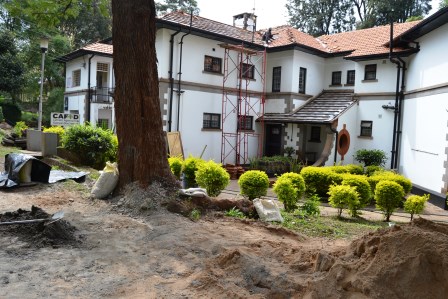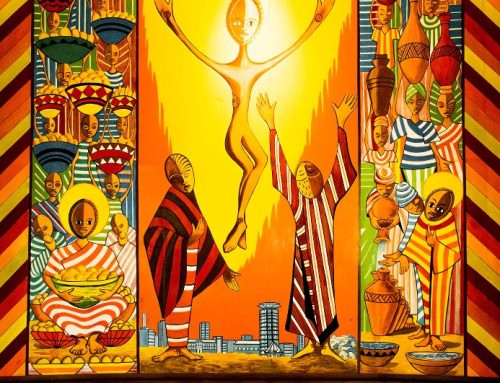Tucked between Riara Road, Riara Lane, and the seasonal Riara Springs lies a hidden gem in Nairobi’s Kilimani area, the Arrupe-Amani Campus. Acquired in 2001 by the Society of Jesus, this 4.8 hector parcel of land, formerly owned by Barclays Bank of Kenya (now Absa Bank), has served both practical and strategic roles in advancing the Jesuit mission in the Jesuit Conference of Africa and Madagascar (JCAM).
The purchase of the Riara Road property was a response to increasing demand for residential space at Hekima University College, Jesuit School of Theology (JST) Campus which faced a surge in theology students in the early 2000s. In a letter dated May 2000, Fr Eugène Goussikindey, the then Rector of Hekima addressed JESAM (Jesuit Superiors of Africa and Madagascar) now JCAM, highlighting the need for additional accommodation. During the Thirty-Third JESAM Plenary Meeting in Rome (April 2001), the decision to acquire the property was approved; with 70% of funding from the Assistancy and 30% from the Eastern Africa Province, and further support from the British, German, and U.S. Jesuit provinces.
The property comprised of two distinct residential structures. Near the main gate stands a charming English-style, two-storey bungalow with distinctive wooden pallet roofing, an architectural anomaly amid the vertical urban expansion of Kilimani. Closer to Riara Lane lower gate is a block of four modern, two-storey executive apartments.
Historically, the Riara property provided overflow accommodation for Hekima Jesuit Community and later hosted the JESAM Community before their relocation to Dagoretti Road. Today, the bungalow houses the Centre for Research, Training, and Publications (CRTP) and the Proposed Hekima University (PHU). The former servant’s quarters have been leased to private tenants, including a travel agency.
Since its acquisition, the Riara Road property has continued to evolve. In 2008, the five storey Arrupe-Amani Building was constructed, marking a significant expansion. This paved the way for the Hekima Institute of Peace Studies and International Relations (HIPSIR) to move in with its growing programs. In 2010, HIPSIR ceded its third floor, previously used for classes and a library, to the Jesuit Historical Institute in Africa (JHIA), which transformed the space into an archive, specialized library, and research offices.
What was once an overflow residence has now become a thriving hub of scholarship, research, and collaborative mission, an enduring legacy of Jesuit foresight and partnership in the region, and beyond.
The modern apartment block, which since 2020 sustains JHIA’s mission, remains a vital space for Jesuit collaborations. It currently accommodates the Jesuit Centre for Safeguarding in Africa (JCSA), and other units are leased to partners such as CAFOD, and Medic Mobile. This was a strategic decision made by the then JCAM President, Fr Agbongkhianmeghe E. Orobator, in 2020, for the financial sustainability of the Institute.
Renovation efforts have recently accelerated. The most pressing was a complete overhaul of the roofing system due to recurrent leakage, exacerbated by the long rains. The project, also includes upcoming civil works like pavement upgrades, this was made possible by JHIA’s reserves, and a generous donation from benefactors who wish to remain anonymous, with the support of Hekima University College Principal, Fr Marcel Uwineza.
On the tech side, JHIA’s ICT Department is spearheading the updating of its longstanding Storage Server. The current systems setup, built on repurposed hardware and Open-Source Software, has served faithfully on a shoestring budget. However, with growing digital demands, including the Jesuit Photo Archives, Digital Archives, Newspaper Digitization, and the Maps Digitization Projects, a system upgrade has become essential.
As Fr Jean-Luc Enyegue, Director of JHIA, once observed, “It is difficult to fund an archive when children are starving, schools, and hospitals are under-resourced—but knowledge must also be preserved and shared.”
By Denis Mũnyua
Jesuit Historical Institute in Africa



